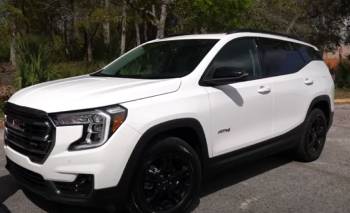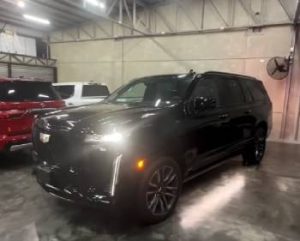When in the market for a new SUV, many drivers find themselves grappling with the age-old debate: GMC or Toyota? Both have earned a reputation for delivering solid vehicles, but which one takes the lead when it comes to overall quality, durability, and style?
Let’s dive deep into the pros and cons of both, ensuring your next car-buying decision is well-informed.
A Brief Comparison Table
| Feature/Aspect | GMC | Toyota |
| Brand Image | Professional Grade; Ruggedness & Luxury | Longevity, Reliability & Innovation |
| Design | Bold, Aggressive | Streamlined, Conservative |
| Performance | Power & Towing Capacity | Efficiency & Reliability |
| Engine Options | Larger, More Powerful Engines | Balanced, with Hybrid Options |
| Interior & Comfort | Luxurious in Higher Trims (e.g., Denali) | Comfortable across Range |
| Price Point | Generally Higher | Competitive; Good Long-Term Value |
| Safety Features | Advanced, especially in higher trims | Pioneering; Standard across many models |
| Tech & Infotainment | State-of-the-Art in higher trims | Advanced & User-Friendly |
| Global Presence | Strong in North America | Massive Global Footprint |
| Resale Value | Decent, Especially for Popular Models | Exceptional across the Board |
GMC SUVs: The Pinnacle of Ruggedness

Pros:
- Built Tough:
GMC SUVs are often lauded for their durability and sturdiness. They can handle rugged terrains and adverse conditions, making them excellent for off-road adventures.
- Luxury Touch:
GMC, especially models like the Denali, has an element of luxury, boasting high-end finishes and features.
- Powerful Engine Options:
GMC is known for vehicles that offer powerful engine options, such as the one in the GMC Terrain.
Cons:
- Fuel Efficiency:
Due to their robust nature, GMC SUVs can sometimes fall short in terms of fuel efficiency.
- Higher Price Points:
The combination of power and luxury sometimes means a steeper price tag.
- Bulkiness:
The size and weight can make city navigation and parking a tad tricky.
Also Read: Problems With Morimoto XB LED Headlights.
Toyota SUVs: A Blend of Reliability and Innovation
Pros:
- Unparalleled Reliability:
Toyota SUVs, including the legendary RAV4 and Harrier, are renowned for their long lifespan and minimal need for repairs.
- Fuel Economy:
Toyota has always been a forerunner in fuel-efficient vehicles.
- Tech-savvy Features:
Modern Toyota SUVs come packed with advanced technological features, ensuring a futuristic driving experience.
Cons:
- Slightly Conservative Design:
While functionally effective, some users find Toyota designs to be less flashy than their counterparts.
- Price Hike for Hybrids:
While Toyota offers hybrid SUV options, they come at a higher cost.
- Limited Off-road Capacity:
Though durable, not all Toyota SUVs are suited for rigorous off-roading.
Key Differences Between GMC and Toyota SUVs
When comparing two automotive giants like GMC and Toyota, it’s evident that they both approach the SUV market with different philosophies and offerings. Here’s a detailed exploration of the key differences between GMC and Toyota SUVs:
- Philosophy & Brand Image
GMC: GMC prides itself on being ‘Professional Grade.’ This mantra refers to the ruggedness, reliability, and high performance of its vehicles. GMC SUVs are often perceived as brawny, robust, and, in many cases, luxurious – especially with their Denali line.
Toyota: Toyota’s brand image revolves around longevity, reliability, and innovation. The automaker has been at the forefront of hybrid technology and consistently promotes a vision of sustainable mobility.
- Design & Aesthetics
GMC: GMC SUVs usually feature a more aggressive and bold design, with sharp lines, a dominating grille, and an overall imposing presence. This design philosophy aligns with the brand’s image of rugged and professional-grade vehicles.
Toyota: Toyota SUVs have a more streamlined and conservative design. Recent models, like the RAV4, have started adopting a more aggressive look, but the design is generally more understated than GMC.
- Performance & Engine Options
GMC: GMC is known for its powerful engine options. For instance, the GMC Yukon’s available 6.2L V8 engine delivers impressive horsepower. GMC’s focus has traditionally been on power and towing capacity.
Toyota: While Toyota does offer potent engines, especially in models like the Land Cruiser, the brand’s focus leans more towards efficiency and reliability. Toyota has been a leader in hybrid technology, offering hybrid variants for many of its SUVs.
- Interior & Comfort
GMC: GMC’s higher-end models, especially the Denali variants, come with luxurious interiors featuring leather, wood trim, and state-of-the-art infotainment systems.
Toyota: Toyota offers a comfortable interior across its range. While base models might lack some of the luxury touches GMC provides, higher-end models like the Highlander Platinum can rival the luxury found in GMC SUVs.
- Price Points & Value
GMC: Generally, GMC SUVs tend to be priced a bit higher, especially when comparing the luxury Denali trims. The brand positions itself as a blend of performance, ruggedness, and luxury, and the price reflects that.
Toyota: Toyota SUVs usually offer a competitive price point with a reputation for long-term value. Their vehicles are known for their longevity and minimal depreciation.
- Global Presence & Market Reach
GMC: GMC has a strong presence in North America, especially in the United States and Canada. Their SUVs are tailored more for the American market and preferences.
Toyota: Toyota has a massive global footprint. Models like the RAV4 and Land Cruiser are renowned worldwide, making Toyota a truly global brand with SUVs tailored to various markets.
Also Read: Differences Between Altra Olympus 4 And Hoka Speedgoat.
Frequently Asked Questions (FAQs)
Both brands have their own set of merits. GMC SUVs typically appeal to those looking for power and luxury, while Toyota stands out for reliability and innovation. Your personal preference and requirements will determine which is better for you.
The GMC Terrain can be seen as the GM equivalent to the RAV4 in terms of size and market segment. However, each has its unique features and specifications.
In the Toyota lineup, the Toyota Highlander and Sequoia are both larger than the RAV4. From GMC, the Yukon is substantially bigger than the RAV4.
The GMC Terrain offers a range of engines, including a 1.5L turbocharged 4-cylinder engine and a 2.0L turbocharged 4-cylinder option, providing a blend of power and efficiency.
While the RAV4 boasts several luxury features in its higher trims, it’s not typically categorized as a luxury SUV. However, its comfort and technological amenities can certainly give some luxury brands a run for their money.
No, the RAV4 and the Harrier are quite comparable in size. The Harrier, however, is primarily marketed in Asian markets, while the RAV4 has a global presence.
Conclusion
In conclusion, the debate between GMC and Toyota SUVs boils down to what you value most in a vehicle. If power, ruggedness, and luxury top your list, GMC might be the way to go. But if you’re searching for a blend of innovation, reliability, and efficiency, Toyota SUVs are hard to beat. Ultimately, the decision rests in your hands. Always test drive and compare models to determine which resonates best with your needs and preferences.
Given the differences, the decision between GMC and Toyota boils down to individual preferences and requirements. Whether you prioritize luxury and power or longevity and efficiency, both brands have something unique to offer.




